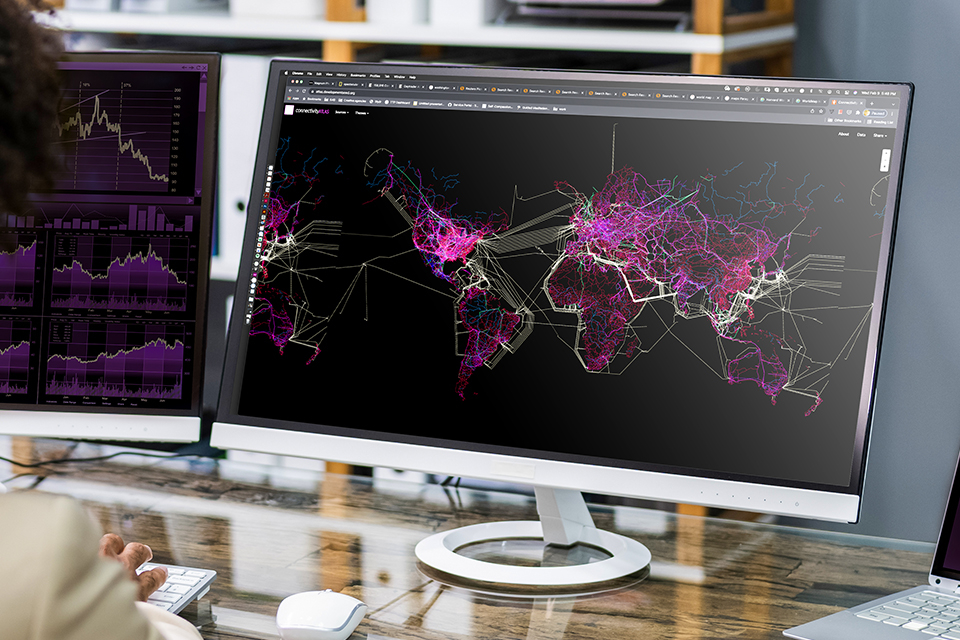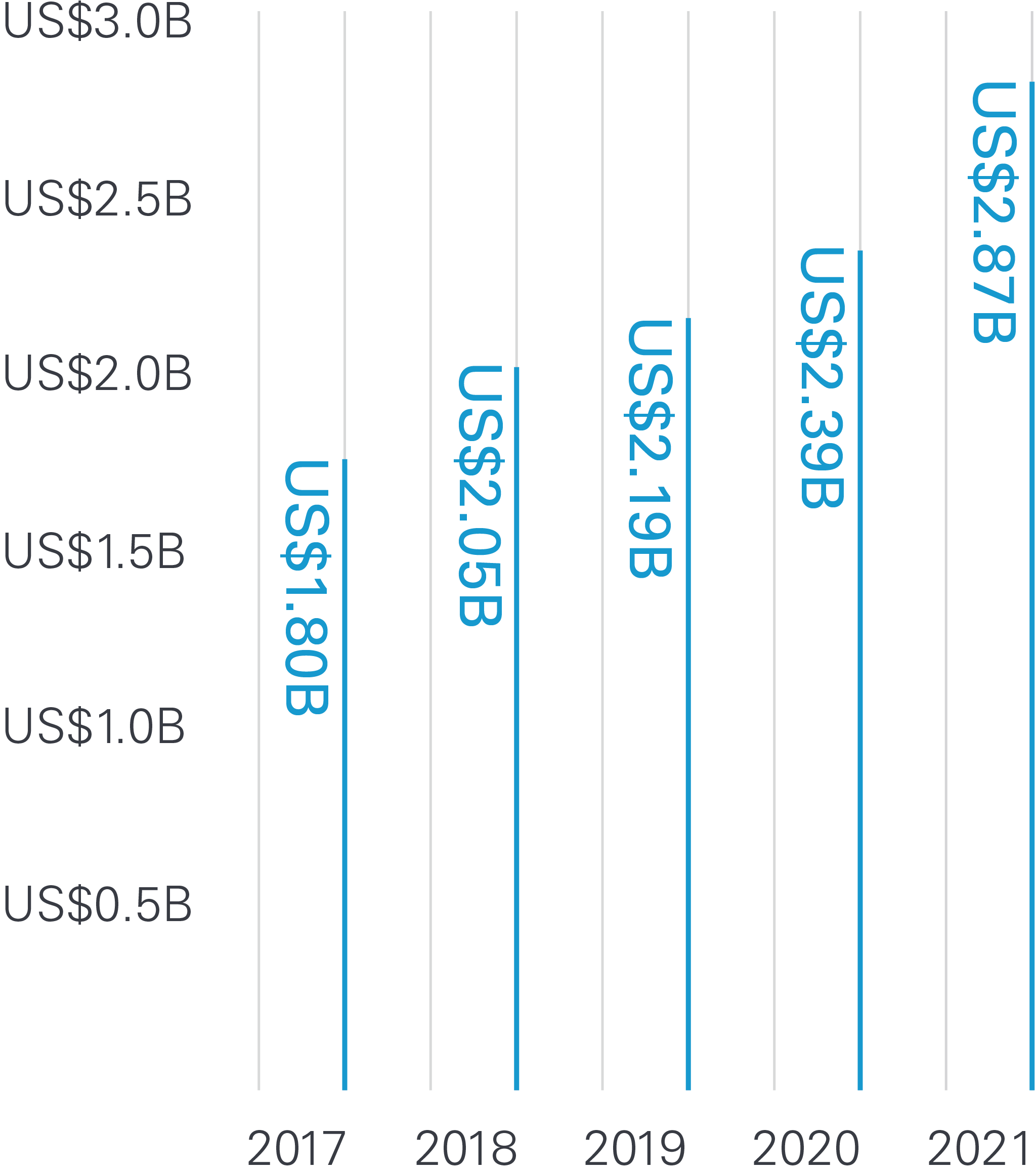What have we learned from COVID-19?
Epidemiologist Syra Madad says it’s critical to engage with local communities



Hugh Verrier
Chair
In 2021, the COVID-19 pandemic continued to affect nearly every aspect of our lives. Against this backdrop, our global teams worked on groundbreaking transactions, resolved high-stakes disputes and, through our global citizenship initiatives, responded to societal challenges around the world.
The role of business in society evolved as environmental, social and governance (ESG) issues entered the mainstream, concentrating on challenges including the energy transition and achieving greater diversity and inclusion. Like our clients, we looked for ways to create long term value and growth—a shared goal that created opportunities for collaboration.
It was in this context that we launched a new five-year strategy, focused on creating a distinctive experience for our clients.
Our emphasis on complex, cross-border matters helped us grow in all of the regions where we work and achieve outstanding results for our clients. As we look to the next five years, we are committed to building the capabilities our clients need, supported by a strong, resilient culture.
Guest speakers at Firm events talk about issues that made news in 2021
Epidemiologist Syra Madad says it’s critical to engage with local communities

Think tank CEO Chris Pinney is encouraged by moves to focus on impact, not just policies and procedures

Bill Emmott, who co-leads a nonprofit that studies the far-reaching effects of COVID-19, discusses the importance of business scenario planning

Developments that reshaped the world
Countries and companies are increasingly committing to net-zero goals that would require them to significantly reduce carbon emissions on relatively short timelines

The pandemic accelerated global concerns over climate change and inequality, pushing societal expectations around responsible business practices into the spotlight

Most of 2021 was characterized by free-flowing capital, as government aid in response to COVID-19 propped up economies

Globalization may be evolving, as nations and regions reassert their regulatory powers on a wide range of issues

Matters in eight practice areas that highlight our global impact for clients
Our 2021 achievements cap an outstanding five-year success story

2,464 Total lawyers
An outstanding roster of talented lawyers strengthened our Firm in 2021

White & Case earned many of the legal industry’s top accolades for outstanding performance in 2021

White & Case is committed to fair and ethical operations that respect human rights and recognize the importance of our natural environment.
As a signatory to the UN Global Compact we affirm our commitment to doing business responsibly by supporting the Compact’s ten principles on human rights, labor, the environment and anti-corruption. The steps we are taking to continue to embed these principles into our Firm are outlined in our most recent Communication on Progress.
Our latest Environmental Sustainability Report includes information on our environmental policies, footprint, key actions and goals.
Where White & Case is a longtime leader — and we're just getting started.
10 global affinity networks
Our ten global affinity networks foster a sense of community among the Firm’s Black, Asian, Latinx/Hispanic, Middle Eastern, minority ethnic and LGBT+ lawyers, business services professionals and their allies. Each network sets its own agenda, initiatives and goals, which are specific to the issues it feels are most important. Affinity networks also create and enhance awareness of these groups within the Firm and its larger culture, drive community and connection across our global offices, and support their members with career and professional development opportunities.
26 local women’s networks
Our 26 local women’s networks are active in 40 offices across the Americas, EMEA and Asia-Pacific. These networks foster professional development and mentoring activities, and support business-related client partnerships. They also provide a forum for our lawyers and business services professionals to share perspectives and create programs to support and retain our talent while fostering and promoting gender equity.
For more than a decade, leading publications and alliance organizations have recognized White & Case’s commitment to diversity and inclusion.
We continued to advance toward our diversity and inclusion goals, narrowing the gap between thought and action with new trainings

Like our clients, we are seeking ways to sustainably create long-term value and growth, a shared goal that presents opportunities to collaborate

We set out to ensure we provide our clients with an experience that emphasizes the attributes they seek in a trusted advisor


Bill Emmott, who co-leads a nonprofit that studies the far-reaching effects of COVID-19, discusses the importance of business scenario planning
Bill Emmott is co-director of the Global Commission for Post-Pandemic Policy, a non-profit non-partisan organization of scholars, scientists and others convened to consider the wide-ranging issues related to the COVID-19 pandemic and its aftermath. Emmott, an author and former editor-in-chief of The Economist, spoke to White & Case about redefining the new normal during an October 2021 virtual event for our Tokyo office.
We spoke with him about globalization, economic realities and business scenario planning in a world that is not yet post-pandemic. An edited and condensed version of that conversation follows.
You’ve described the pandemic as ”perpetual.“ What do you mean by that?
I don’t mean that it will last forever. Pandemics never last forever. But we are in a long-term pandemic and have to adapt. Government policy in all countries is still playing catch-up and dealing with the virus as it develops, rather than gaining control of the virus. That makes it impossible to know whether this pandemic will go away or return. We also have to acknowledge that the world is not just facing the pandemic, but rather, four intersecting, self-reinforcing crises simultaneously. One is the pandemic itself—a biological crisis. Two is the environmental crisis. The biological and environmental crises are closely linked, as global population growth has enabled diseases like the coronavirus to jump from wildlife to humans. The third crisis could be described as a crisis of truth—the disbelief in expertise and science, which is especially critical in the United States, the world’s leading economy. Finally, there is the growing divide between the two great superpowers, the US and China.
How has the pandemic affected globalization?
Globalization has been less affected by the pandemic than we might have expected. Some of the retreat from globalization had already happened, particularly the trade tariffs imposed by the Trump administration on exports from China, the impact of Britain’s withdrawal from the EU and the general weakening of the World Trade Organization. While the pandemic limited the free movement of people, thanks to technology, the movement of ideas was not hindered. Free movement of intellectual property was as rapid as ever. We saw that in the collaborations between companies to develop COVID-19 vaccines and treatments. Although trade in goods was hindered, it was due to issues like staffing in ports and airports, and not to deliberate government policy. So, although there are threats to globalization, it should continue to be a major force of our times.
What are the threats to globalization?
Climate change is one. Much of the effort to deal with climate change will involve the imposition of carbon taxes and there will be questions about how that translates into trade policy. This could lead to protectionism and trade blockages. But the most important threat is the potential that technology could develop along two separate tracks, one for China and one for the West. New technology transfer barriers have been set up between the West and China. So far, they have not had a big impact on international trade, but the potential exists. In addition, there is a sense of diverging standards surrounding technology in different regions of the world. A world in which you have separate standards is one with less free movement and less globalization.
How would you characterize the global economic recovery from the pandemic so far?
It has been remarkably fast, but highly divergent. Advanced economies have recovered very rapidly, and countries in the developing world—in Latin America, Africa and the lower- and middle-income Asia-Pacific countries—are still suffering from slumps. This situation suggests that in the next few years we should see some risk of sovereign debt crises in the weaker economies. Sovereign debt crises may be triggered by rising interest rates on US dollar borrowings. Alongside that, and one reason why US borrowing rates are likely to rise, we’re seeing rapid cost inflation in international trade, caused by pandemic-related supply chain problems in many countries. Over time, these may ease, but if we see this as a perpetual pandemic, we have to also assume there will be continued supply chain interruptions as the pandemic evolves.
What can businesses do to deal with the pandemic?
We have to incorporate all aspects of the pandemic into business planning, especially the newest aspect, which has been government-imposed restrictions globally. In the past, scenario planning looked at government regulation and policy, but very few companies considered the possibility that governments would impose restrictions on travel into and out of countries or sudden regulations about working hours in response to health threats. This uncertainty of government behavior affects companies of all kinds, and corporate boards will need to incorporate it into all of their plans.
Photo by Keith Ladzinski © Bespoke Reps Licensing
A walk along the Seine River in Paris